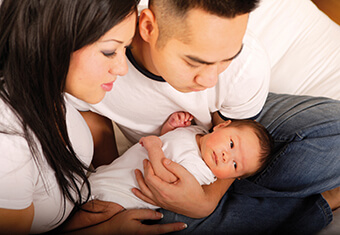If you die and your child is under 18 then it is common for the surviving parent to take guardianship of your child – although they must have parental responsibility.
If there is no one else with parental responsibility to look after your child, then the court will make the decision for you and it could be a complete stranger. This is why it is so important that you nominate a guardian for your child in your will.
What is a guardian?
A guardian is someone who you name in your will to look after your child until they reach the age of 18. It would usually be someone who you trust implicitly with your child’s well-being and who already has a close relationship with them. Since it is largely impossible to know how or when you will die it is prudent to name a backup guardian in case the circumstances of your first guardian have drastically changed when the time comes. If you have separated from the child’s second parent it is sensible to name the same guardians in your wills to avoid any dispute if you both pass away.
It is important to note that if a surviving parent is alive with parental responsibility, care of the child will always pass to them, regardless of guardianship nominations in your wills.
What are their responsibilities?
They will basically be acting as a parent for your child until he or she reaches the age of 18. They will be responsible for their health, safety, welfare and education and will have a legal duty of care towards them.
How do I appoint a guardian?
The most common way to appoint a guardian is through your will, although it can be written on a separate note as long as it contains clear instructions and is signed and dated. That said, it is best to use your will so that you can synchronise your appointment of guardians together with who your estate should pass to. For example, you may instruct that your estate passes to your children unless they are minors in which case the guardianship clause kicks in and the money will be held by the guardians as trustees for the children until they reach 18. Your guardians can use the money held in trust to pay for the children’s everyday living expenses, education and well-being. The objective is that the guardian will not be out of pocket for the children’s expenses but the money must be used for the best interests of the children and not for the guardians’ benefit.
Who should I appoint?
It is completely up to you who you appoint as guardian, but in most cases it will be a family member or close friend. Ideally it should be someone who already has a close relationship with your children. Other considerations may include:
- Location: ideally you don’t want to have to uproot your children from their friends and school, so if you have family in the area, it may make more sense to appoint them over someone who lives on the other side of the country.
- Age/health: an older relative may not be able to care for your children in the long term
- Suitability: Are their values similar to your own? Can they offer stability? If they already have a family, would they be able to manage the additional responsibility?
Should I ask them first?
It is a good idea to discuss the appointment with the guardian first. There could be a valid reason that you haven’t thought of why it would be impossible or impractical for them to be a guardian at a later date. For peace of mind it is best to obtain their consent first.
 UK
UK  Canada
Canada

